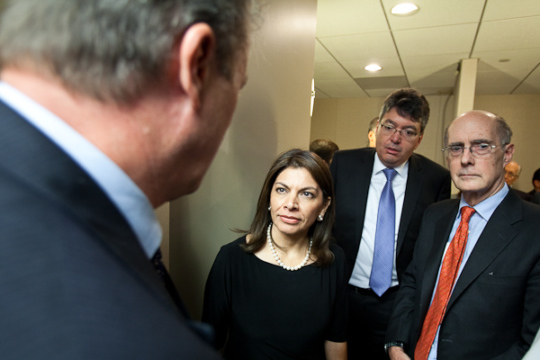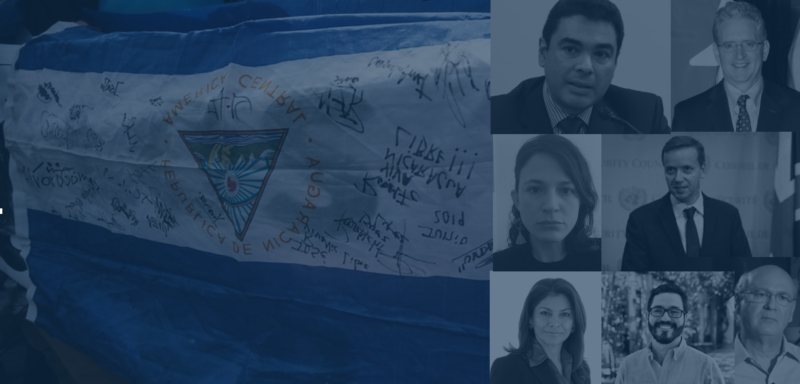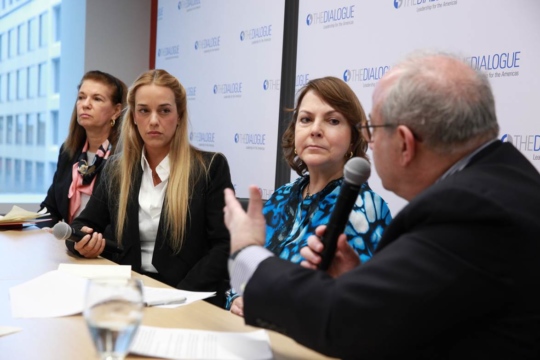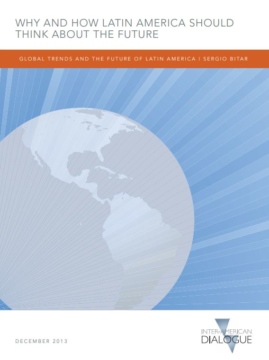
Foreign election observers to cast their eyes on the U.S. presidential vote
The world will be watching from close-up when the United States chooses a president next month, as foreign election observers fan out to polling places across the country.
On January 12th, 2022, the Inter-American Dialogue hosted a panel called “Nicaragua 2022: Is a Political Transition Possible?” to explore the changing political situation in Nicaragua.
The panel was introduced by Michael Shifter, president of the Inter-American Dialogue and moderated by Manuel Orozco, director of the Migration, Remittances, and Development program at the Dialogue.
The experts participating in the panel included Laura Chinchilla, former President of Costa Rica and Co-Chair of the Inter-American Dialogue, Hugh Adsett, Canada’s Ambassador to the Organization of American States (OAS), Carlos Fernando Chamorro, Director of Confidencial Magazine, Ana Lucía Alvarez, Economist, human rights defender, and relative of 3 women political prisoners, Jesus Tefel, Founding member of National Blue and White Unity, and Gonzalo Koncke, Chief of Cabinet of the Secretary General, Organization of American States
Orozco sparked the debate by asking the panelists to interpret the meaning of Ortega’s ‘Tabula Rasa’ statement at his fourth presidential inauguration.
Chinchilla, Adsett, and Koncke pointed out that the sentiment of “tabula rasa” started during the events of April 2018. They stated the administration is keen to mask the spiral into authoritarianism that started in 2018 through the rhetoric of tabula rasa. Koncke explained that incarcerating political activists and suppressing political liberties are examples of how Ortega-Murillo have already applied “tabula rasa” before this new iteration of their regime.
Chamorro stated the “tabula rasa” reference was directed to the private sector, but the translation of “tabula rasa” in practical terms will only be seen in the coming months. Tefel theorized that Ortega is trying to sell a new economic and political model with “tabula rasa” to private businesses in Nicaragua, which includes new relationships with partners such as China. Importantly, Alvarez claimed that any political movement that seeks legitimacy to change the situation in the country must be accountable to the powerful social movement headed by victims of the repression.
1) Laura Chinchilla, how do you recommend that international players respond to the present situation?
Chinchilla conveyed that the political situation in Nicaragua will not change unless the international community implements harsher measures. Her response focused on a multipronged approach utilizing sanctions, including individual sanctions against key officials, sanctions directed at the army and broader economic sanctions. She stated that sanctions must be supported by a clear diplomatic strategy, including the activation of OAS Article 21.
2) Ambassador Hugh Adsett, what is next for the OAS, after Nicaragua was declared an illegitimate election?
Adsett discussed the role of the international community towards domestic activism in Nicaragua. He mentioned that Canada has tried to press solutions by co-chairing the Permanent Council Working Group on Nicaragua. Regarding the next steps, Adsett said that the Permanent Council of the OAS asked to have a meeting with the government of Nicaragua, so the members of the council can only decide on future actions once the Secretary General reports back.
3) Carlos Fernando Chamorro, what other kind of pressure is needed, beyond sanctions, that can move the needle toward prisoner release and political reforms?
Chamorro warned that Ortega will not give up unless he faces an extraordinary national and international pressure that provokes an internal breakdown within the regime, forcing his exit from power. The United States and European Union’s international sanctions exercise some pressure, but they don’t have a key impact in the domestic situation. Chamorro established that policymakers and leaders of the democratic movement should discuss the conditionality between foreign pressure and restoring democratic freedom.
4) Ana Lucía Alvarez, what are relatives of prisoners expecting from national and international leaders to get them free under these false accusations?
Alvarez argued that the values of justice, truth, and memory are at the heart of a new social contract. Alvarez agreed that international commitments must be aligned with domestic activism, while making sure that the restoration of human rights is at the forefront of the agenda. Alvarez expressed that much work can be done, such as funding the International Federation of Red Cross.
5) Jesús Tefel, is the opposition in a position to change the status quo? Is it possible to pressure Nicaragua from within to start moving in a positive direction?
Tefel emphasized that most leaders are either in exile or hidden in Nicaragua. He argued that despite the political repression, the political majority within Nicaragua rejects Ortega. Therefore, formal Nicaraguan political institutions must support the opposition to Ortega. This is separate from the pressure that international sanctions provide, but the pressure that can be channeled inside Nicaragua needs to be synchronized and coordinated with the international pressure.
6) Gonzalo Koncke, what has come out of Secretary Almagro's efforts to communicate with the Nicaraguan government, and what else can the secretary general do on this regard?
Koncke stated that the diaspora and the domestic pro-democracy movement are large contributors to challenging Ortega’s actions. He highlighted the value of diplomatic mechanisms to resolve the crisis through the OAS. Koncke recalled that past OAS diplomatic missions have resulted in better oversight of human rights violations and the release of political prisoners. Nonetheless, he also noted that the OAS efforts might not result in the full reversal of Ortega’s policies.
The world will be watching from close-up when the United States chooses a president next month, as foreign election observers fan out to polling places across the country.
Tintori has been committed to spreading the word on the political situation in Venezuela for the past three years since her husband was imprisoned by President Maduro’s government. Throughout the event the speakers highlighted that there is an undeniable dictatorship in Venezuela that hinders power autonomy, prosecutes dissidents, and violates rule of law and human rights regularly. Tintori also stressed the urgent character of what is the worst humanitarian and economic crisis in the country’s history. She advocated for the immediate release of Leopoldo López, Antonio Ledezma, and all the 108 political prisoners.
Over the past decade, many Latin American governments have made significant strides in developing domestic policies that have succeeded in reducing poverty and strengthening democratic institutions. Yet the impact of profound transformations in the global economy, climate change, and new information and communication technologies makes it clear that the region’s future will be inextricably connected to developments taking place beyond the borders of individual nations.
 Cortesía | Confidencial
Cortesía | Confidencial

